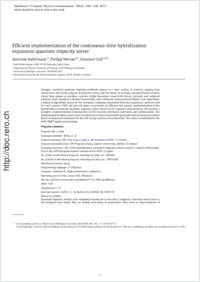Efficient implementation of the continuous-time hybridization expansion quantum impurity solver
- Hafermann, Hartmut École Polytechnique, CNRS, Palaiseau, France
- Werner, Philipp Department of Physics, University of Fribourg, Switzerland
- Gull, Emanuel University of Michigan, Ann Arbor, USA - Max Planck Institut für die Physik komplexer Systeme, Dresden, Germany
-
19.12.2012
Published in:
- Computer Physics Communications. - 2013, vol. 184, no. 4, p. 1280–1286
English
Strongly correlated quantum impurity problems appear in a wide variety of contexts ranging from nanoscience and surface physics to material science and the theory of strongly correlated lattice models, where they appear as auxiliary systems within dynamical mean-field theory. Accurate and unbiased solutions must usually be obtained numerically, and continuous-time quantum Monte Carlo algorithms, a family of algorithms based on the stochastic sampling of partition function expansions, perform well for such systems. With the present paper we provide an efficient and generic implementation of the hybridization expansion quantum impurity solver, based on the segment representation. We provide a complete implementation featuring most of the recently developed extensions and optimizations. Our implementation allows one to treat retarded interactions and provides generalized measurement routines based on improved estimators for the self-energy and for vertex functions. The solver is embedded in the ALPS-DMFT application package.
- Faculty
- Faculté des sciences et de médecine
- Department
- Département de Physique
- Language
-
- English
- Classification
- Physics
- License
-
License undefined
- Identifiers
-
- RERO DOC 31330
- DOI 10.1016/j.cpc.2012.12.013
- Persistent URL
- https://folia.unifr.ch/unifr/documents/302783
Statistics
Document views: 116
File downloads:
- pdf: 347
